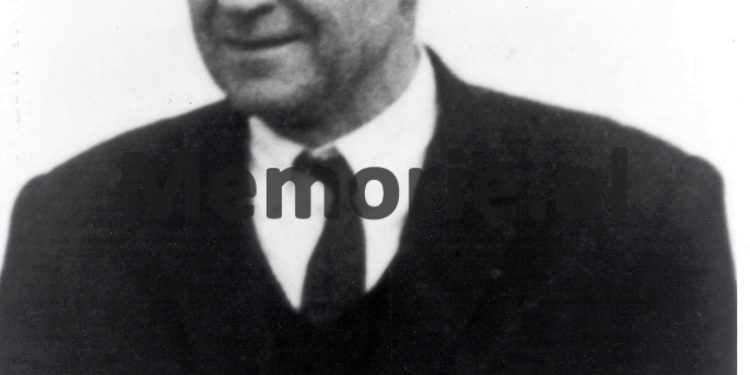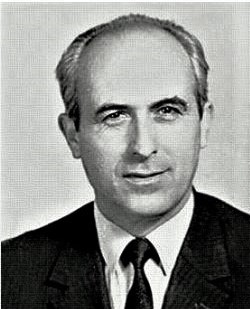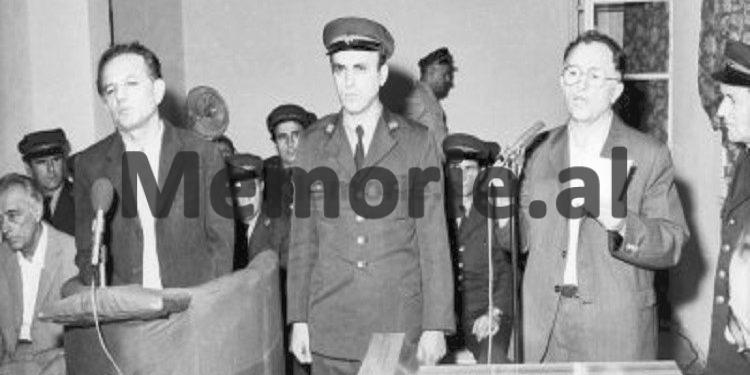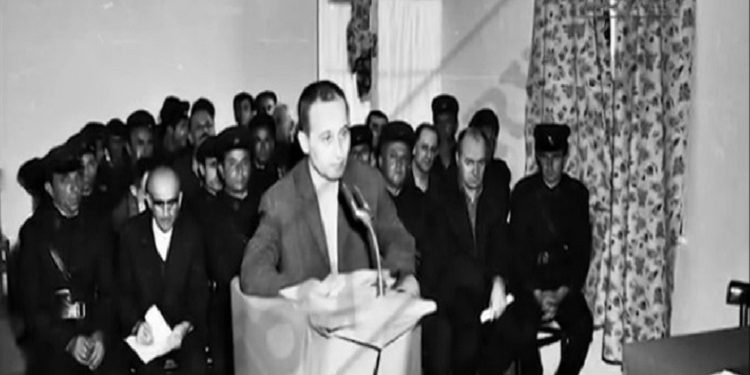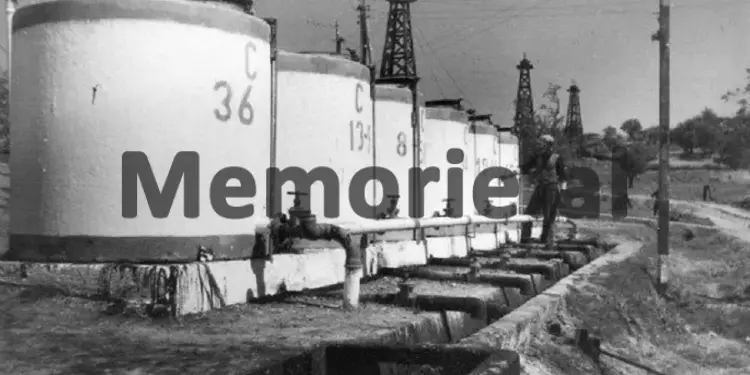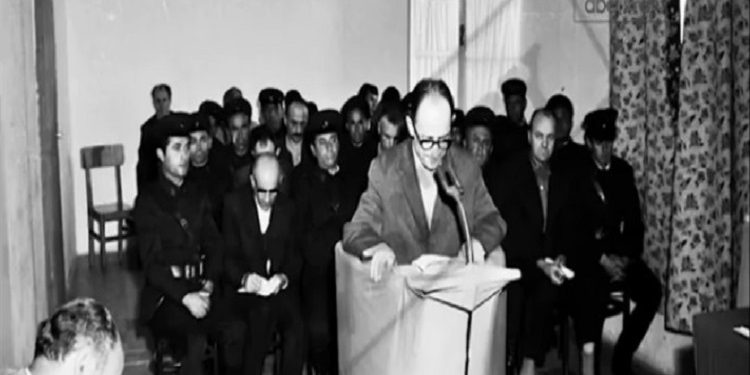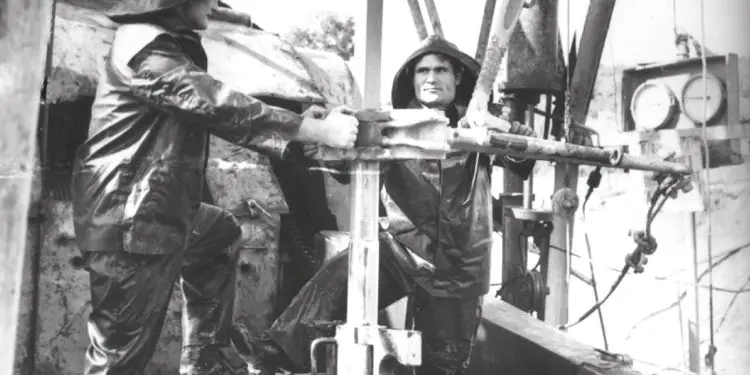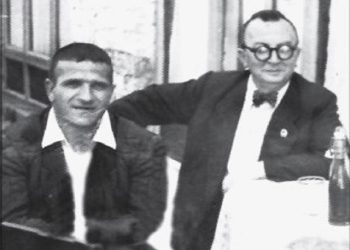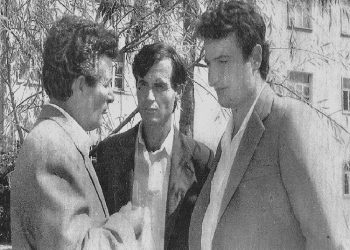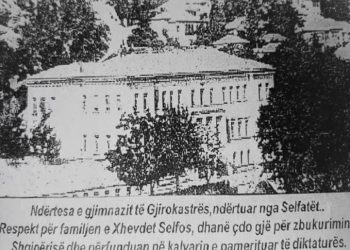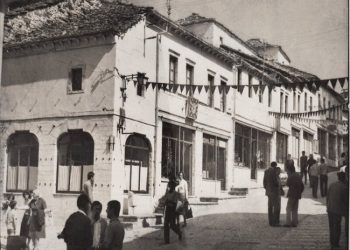By Petraq Xhaçka
Part fourteen
Memorie.al / The purpose of this book is to join the efforts made to present the truths and horrors of the communist dictatorship in Albania. The main purpose of the book is not to show our people or anyone else that we oilmen have been innocent, because this has become known from publications in our press, from foreign televisions, as well as from direct meetings with the International Forum and the Albanian Human Rights. The author’s desire, is that through this story, along with other stories, fight any manifestation in any form, even moderate, that he may have to create a communist society. I think that even through this bitter personal history, the cruel, treacherous and overbearing face of Enverism will appear, that for half a century, held the knife with the tip in the chest of the Albanian people, with a pine eye, intercepting the movements for salvation from the outside, or rebellion of the people themselves, ready to push the knife to the heart, at the first movement. The events have been set in the economic fields where it has appeared most strongly, such as the oil and gas industry, where I was fortunate to pour my energies, for a lifetime, and become a participant and witness in those events. All the events that are written in this memoir are true, not only without any exaggeration or embellishment, but perhaps, I don’t know how much I have been able to present the terrifying force of the events that took place in that decadent system of socialism, where no there was no human feeling.
That March day in Patos
The senior oil specialists had suffered a very strong shock and were now waiting in confusion as to what would happen to them next. This was an unprecedented state of tension, but such was needed by the people who had now seized the banner of purity and loyalty to the Labor Party. They raged through the meetings for the punishment of the leaders, on whom the lightning bolts of the mad leader had already been fired. Even they wanted the list posted for punishment to be expanded. And as if in a fever, they wanted to fry their hands, in that big butchery of oil cadres. A technician, when he saw one day that some cars came to the Institute and from them arrived employees of the Department of Internal Affairs, he came out shamelessly to meet them and with a certain wild satisfaction, he said to them: – You came to arrest others ? Who’s turn?!
Dictatorship taught people to rejoice in the misfortunes of others, without giving any thought to whether or not those misfortunes were deserved. But, apparently, it was noticed that it went too far and the jerk was restrained. But it was gone. In those turbulent days of tensions and intrigues, when a very big research and organizational work called us, I received the notification that the next day, March 5, 1975, I had to be in the big cinema hall in Patos. There it would become an asset of extraordinary importance. When I arrived the next day in Patos, I saw that the space around the cinema was filled with soldiers of the Republic Guard, who had come from Tirana. There were countless such soldiers, even on the roofs and balconies of the houses of the citizens, who lived in front of the cinema.
The soldiers there were clearly carrying handguns and some behind their backs, standing at the ready behind some heavy machine guns. These sights were frightening. I had only seen such scenes in movies. As I noticed, many of us were invited by the Institute. We went inside, going through a veritable chain of checks for documents and possible weapons. In the cinema hall, there was a heavy silence of the grave, in contrast to the noises, which this performance hall should have usually, before films and concerts. The show that was being prepared that day there had been far, far away from the song and entertainment. And this was felt by everyone.
As soon as the hall was filled with guests, about nine o’clock, in the presidium of the meeting, the powerful men who had called us there took their seats. There were two members of the Political Bureau of the Central Committee of the Party, Haki Toska and Koço Theodhosi, accompanied by senior officials of the Ministry of Internal Affairs, First Secretaries of the Party Committees in the districts and some ordinary oil workers. This extreme community of the major figures with the workers was so noticeable, that it almost immediately seemed strange to us, that an engineer had not taken a seat in the hall with the rest of us, but was next to them.
As if he was disrupting the carefully sought harmony.
The engineer came from the Oil Institute and the place in the presidium, it seemed, was given to him as a reward, for his diligence in the meetings of the Institute, in the great campaign of unmasking the group, which had already become fashionable to be called mouth full; “hostile”. The central place was occupied by the long table of the presidium, that worker, who had sent a letter to Enver, a letter that served as a starting point, for the discovery of the hostile sabotage activity in oil, as the worker called it and as he liked, the head of the party. For a long time, we discussed with friends about this letter, which was more like a source of alarm. To this day, I still wonder: was it really, simply, his opinion, or did someone else learn it?!
Maybe they told him to do this action, so that the blow would look tribal, according to the demagogic style of Enver Hoxha. In short, it was the workers who signaled the Party that there was a destructive conspiracy in oil. At the start of the activity, the letter was read with the words of Enver Hoxha, where the sabotage activity was condemned with the already known names, which were lined up in the document. As expected, some of those people who were scheduled to be sentenced and whose names were on the list, were forced to stand up and take the floor. The Fatzis were sitting in the hall, far from each other, in different places, while trusted security people had taken their places next to them.
Their excuses and explanations were interrupted by the interventions of the leaders of the meeting, and then, when it was understood that the high-ranking guests from the capital liked this, the accused suffered numerous interruptions, even by the people sitting in the hall. The people marked for sacrifice looked shocked and confused, to the point where they couldn’t take it anymore. No one accepted the arguments they tried to bring. Not only did no one intend to support them or come to their side, but undisciplined outbursts from the hall wanted to take away their right to speak. There – here unknown people stood up and asked the presidium to be brief: The people mentioned by Enver Hoxha, to be taken out and arrested!
These ideas seemed like data on special orders, because in fact the tall specialists, as soon as they came down from the stage, where the lectern with a microphone was placed, were stunned when they saw the arrest bars being thrown there in the hall, in order to everyone watched, especially those they loved to enjoy the view. It felt like a fatal moment, as if these unfortunates, who had once, in this hall, hundreds of times sat by themselves and presided over meetings, had now just completed the last discussion of their lives.
It was a very dramatic reversal…!
Here, exactly in this hall, no more than two months ago, these same chiefs and specialists, had come down from the stage with high decorations on their chests, cheered by the same people who were screaming today; “to be arrested – to be arrested”! These scenes were full of anxiety and people came out of this extraordinary activity with impressions, which they cannot easily forget. They then became known throughout Albania, from the oral stories of one or the other. , since from the newspapers of the time, information could not even be expected. For half a century, the greatest dramas never became objects of the press, terribly politicized communist. Now, the arrested oilmen of that saboteur group were no longer even the specialists foreign, from the paranoid imaginations of the dictator, they were all considered agents of foreign services. They were neither the ballistas nor the birders, with whom the dictatorship had not settled its accounts for years. Before the eyes, the octopus showed how it had eaten and loved to continue to eat his own feet, his own heroes and decorations. The next day he landed at the Institute, the most important part of those who led the meeting in Patos and in front of all the employees, they once again read the infamous speech of Enver Hoxha, held in the Bureau. With their typical satisfaction, those political authorities also demanded once again, for the twentieth or thirtieth time, that all employees recite the condemnation of the activity of the so-called saboteur group.
We were ordered to create a group of specialists in the coming days and bring them out; “where the enemies had sabotaged”, and especially, what “foreign concepts” they had shown in the field of geology and which of course now had to be fought. This material should be of value to the specialists and all employees of the Institute and the base, to taken into account in the work and, in order not to repeat them again. Against the concepts of the condemned cadres, as among the main tasks, it turned out that the research wells should be placed close to the existing resource sites, and not far from them. of course, there is the reason that geologists always, in the first place, search in the known areas, where the presence of oil and gas has been proven. In fact, Albania is a small country and the prospect area for oil is no more than a square, two hundred and sixty long and forty kilometers wide.
And in its entirety, that square constituted a region where research could be developed, naturally with a greater concentration, around existing sites. But if we extend it to the world, the absolutization of this reason, it would happen that neither the colossal deposits of Siberia, nor those in the maritime part of England, where no oil and gas sources were previously known, would have been discovered, nor in Alaska, nor in many other countries. The fate of the oil workers in these foreign countries was that their governors neither cared nor suffered from the syndromes of pretending, that they knew all the technical fields, nor from the passions to teach the geological specialists, where to search for oil and gas. Extend this thesis to the point of absolutization and state that; if you were drilling in areas just a few kilometers away from the existing well, you are doing hostile work, it is a taboo that is harmful to the country’s economy.
If this were to happen, especially in large countries, it would have disastrous consequences. If the Arab-African countries had acted like this a few decades ago, even today they would not have been able to discover those colossal oil and gas riches. But unfortunately we, educated Albanian geologists, also had to respect the scientific criteria that the party drew up for us. Foreigners, I don’t believe they even have our popular proverb; “the priest jumps from the battle”! This is essentially their advantage. Scientifically, the geologist must look wherever he finds favorable structural, cover, geochemical, paleotectonic development, and oil and gas migration elements at depth. The new points of discovery serve as a center for further expansions around it, i.e. close to them, but at the same time, research must also be carried out in other areas.
Determinations with figures from the state should never collide with the logic and scientific arguments of specialists. At that time, Enver Hoxha’s book was also published; “For Oil”. Anyone who reads it clearly sees the infantile and inappropriate intervention of the political leader in a field where he has never set foot. In that book, he went into the technical problems of geology, about which he had not even the most basic scientific knowledge. His theses in that bundle of work were just a few more chains in the daily work of petroleum scientists. In these busy working days and weeks, the appointments announced by Prime Minister Mehmet Shehu also came out. They communicated the appointment to me; the deputy director of the Geological Institute, as part of the division into two sectors of the old Institute. The other sector was that of oil extraction.
When it came to appointing the director, they called me and took my opinion: – We intend to bring that oil worker, the one who wrote to Comrade Enver, as director. With that letter he made an outstanding contribution to the discovery of the hostile group, didn’t he? We believe that he will best implement party policy at the Institute. What do you think, Petraq? How could a worker, who only had a secondary education, without any experience in management jobs, because he had worked in auxiliary sectors of the background and who did not know the oil works at all, only they knew this?! However, I wasn’t as surprised as I would have been; let’s face it, years ago. But in those dramatic days, they gave great priority to political faith. They wanted a police director and point!
I gave them my consent. They asked me to gather the collective, to get the consent of the employees of the Institute. Unanimously, they gave it too! As it turned out later, the leadership of the party in the center understood that even from the formal side, this would not sound good at all, in the scientific opinion of the country. They changed their first opinion and appointed geologist Luçi Pleqi as director. Relations with Luci at work have been very good, as they were built on mutual respect. He had respect for the experience of my scientific and managerial work. He listened to me and supported me without reservations. Man is known for beauty, in cooperation and above. He gets his opinion almost entirely from his studies, from the conclusions he draws and from the solutions he gives to difficult problems. On this basis, my work has been evaluated, both by this director and by other superiors and leaders of the base, with whom my work has closely connected me for decades.
They have come to the same judgment and appreciation for my clean work in the oil industry and have therefore respected me, then and now, in my old age. For this I was and am grateful to those old and honest oil workers, those colleagues, with whom we have poured our sweat, for the good of the country and the people. However, the State Security maintained its reservations about my loyalty to the Party and, as I found out years later, continued to fill my file with untrue things, with distorted and fabricated interpretations, so that if necessary, it could use me as those lemons, which, after being squeezed, are thrown painlessly into the trash can. This psychology and practice, in the history of the communist dictatorship in Albania, was common. This opportunity came, also because I never became a servant of the State Security and I never enjoyed his trust.
My scientific work was enough for me, although with undivided anxieties, although with the conditions of the lack of freedoms of any kind, in an economic sector of special importance, which the leadership of the dictatorship, transformed into a living hell. This was a deep inner suffering, which I could not express to anyone. The only person who lived with these worries was my wife, Zhaneta. Everyone else, from the outside, thought that I was cheerful, happy, that I was a deputy director, or the director of a small directorate, or that I came to work as a widow, in a Soviet or Chinese military car, or that several times I had served abroad, or that my chest was being filled with decorations! They did not know the other side of these “good things”, my inner suffering.
They didn’t know that I could hardly face those injustices, those working methods under that terrible dictate and terror, where life was threatened at every moment, where you had nothing in your hand, but were only “a working animal”. From the shared life with Zhaneta, I saw that she was a smart woman, an extraordinary hostess, who carried the whole load of the family, because I devoted all my time, night and day, to work. She became an exemplary mother, in addition to being a teacher and lady, who won the hearts of students, especially poor children, whom she stayed close to because their parents could not help them. I constantly cried to Zhaneta, that life and work in the oil industry were very difficult, that I could not bear all those stresses, that unbearable hell, where the lives of good and innocent oil workers collapsed. My wife took her share of poisons from my problems.
Our common desire was for me to leave that job. The fatigue was immense and the satisfaction I felt at the beginning when I started working as a technician or in the first years as an engineer was gone. Work had enslaved me, and now I felt as if I were working in an iron vise. I especially began to feel this, when I was given the opportunity to see how freely and calmly foreign specialists worked in Western countries, where no one stopped them, to freely express scientific thought, where no one kept them under terror negative wells, and for work as a whole, and that in their lives they had no restrictions, but a real democracy and freedom. This spiritual suffering then became even greater. And I had to keep all these feelings locked up in myself. My desire to work as a lecturer at the University, where I was wanted, could not be realized, due to the objections of the bodies of the Fier district and the General Directorate of Oil, which did not let me go, justifying that I was a specialist in which they badly needed.
On the other hand, the State Security activated a small group of specialists, who were tasked with arguing the accusations of sabotage, which were brought against the stigmatized group. Among the members of the group, there were people who did this lot of work with great pleasure, but there were also individuals who suffered because of what they were forced to write. The special investigation of Tirana and that of Fier began to call different individuals to testify about words and phrases with a reactionary meaning, heard from the mouths of the protagonists, who were now under bars. Such was the joking saying in social conversations, of one of the geologists, namely Koço Plaku: “We throw the hat. Fiuuu! Where it falls, there we drill”.
None of the oil workers, especially geologists, accepts to say seriously an expression like this. But this joke was also included in the materials that were collected against Mr. Koço himself and his bandmates. As funny as it is to accept its truth, so terribly serious, this statement was made about the fate of that martyr of Albanian oil research.
Among dozens and dozens of oil workers, managers and workers called to the investigator, I was also marked to be called. Memorie.al




